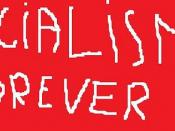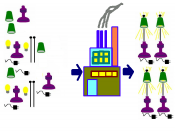Socialism as a pure political ideology is not in practice without some form of capitalism in today's world. For the purpose of this essay I will be using the pure form of socialism and any moral case associated with it and also a note on democratic socialism. In considering how to reach a valid conclusion on this essay we must first determine what is "moral" when it comes to politics in society. Classical utilitarianism is a compelling option and states that we should do whatever maximises the balance of pleasure over pain for everyone affected by our action. To be moral is, by definition, to be concerned with promoting the well-being of others, not just oneself. Well-being is determined by happiness, however happiness is construed in detail. So to be moral is to be concerned with promoting the happiness of others, not just oneself. But morality requires also that one not favour any particular person.
To do so would be unfair. We may put this by saying that morality requires impartiality. So to be moral requires that one be impartial in being concerned with promoting each person's happiness equally. This is a modern conception of morality. It does not rely on a divine being to provide us with moral rules, but places morality in human nature, in which human beings are primarily motivated by desire and passion, in a consistent effort to avoid pain and misery. People desire happiness, therefore happiness is good, and therefore general happiness is a social good. "Good society," to me, would be a place where everyone is satisfied. So to for socialism to have a 'moral' case everyone must have the opportunity to be satisfied. This 'opportunity' is important as it is impossible for everyone to be born satisfied by our human nature.
According to Kant an act is not morally right if the maxim can't be universalized and that if duties are to be morally binding, they must autonomously be chosen. (Larmore, 2008) Human beings must be free and self determined in their2decisions for themselves and others. This type of equality indicates everyone has the same right at a starting point, and sharing the same opportunity to develop his or her talents through their own actions. Therefore a welfare state or organization should supply the demanded resources. Everyone's needs may conflict, so people need a framework of rules to follow. Even under the restrictions of a socialist government, by human nature, people have their economic and spiritual needs to pursue. This will be discussed in the following paragraphs. Also, they should retain their individuality as much as possible so the society can be flexible.
Socialism has been a controversial ideology from its very conception. It is a revolutionary theory which details the overthrow of bourgeois capitalist democracy and its replacement with a dictatorship of the proletariat. Traditional Socialism views the capitalist economic structure as exploitative and inequitable as private property and profit are accumulated in the hands of a minority of private individuals. Instead property such as factories, land and businesses should be collectivised, run and owned by those who engage in the production or supply of services, and that profit should not exist except as increased shared wages between the owner and workers and attributed on need. Underlying this philosophy is the belief that this system is morally better because it reduces the gap between the rich and the poor and promotes equality. However, one must note that this means that the produce which you make and the work you do is not yours to own, and neither is the money which it reaps. The profit from the services of all members is distributed by the "community", which is the effective governing body.
Who owns your life? Who owns your actions? Who has the right to decide what path you may take in your life? Slavery, we can all agree, is immoral. Each man3owns his own life and right to do with it what he pleases. That is the fundamental human right, equal to all, which we have fought to preserve the entire history of our species. But do we own only our life? What of our produce? Whatever product it is, whatever skill you possess, all forms of production are a combination of the skill of the mind and the willingness of the body. Whether you simply wish to plant a seed and watch it grow, or whether you labour at a desk for hours with equations to create a new technology, both are fundamentally the same. They are created by the decision of our minds. Such things would not exist without the mind. A crop will not plant, grow and sow itself, it must be a conscious decision to perform. The existence of such produce depends on the mind which decided to create it. Likewise, a new technology can only exist at the expense and will of the man who invented it. By the labour of his mind, he created order out of chaos, and created productiveness. Who then owns the right to that produce, whether it is a crop or a technological invention? The government is merely a collection of individuals, not unlike the producer, placed in a position of mediation. Under what moral obligation can a collection of individuals own that which they did not produce? There is no divinity in any person in an equal and moral state.
The majority of people work to pay for food, water, and shelter in addition to extra comforts. It has been illustrated by the attempted socialist governments that people do not work for the state, they work for themselves and family. However, socialists argue that human beings are in fact rational beings, and rather than guided by their desires, are able to improve and reform their condition. The belief which is endorsed by some sociologists such as Cohen is that rather than operating on a system purely based on material incentive, human beings are able to contribute to society to4improve the general condition of their 'brothers' and 'sisters' in a communal spirit. While this sounds generous, nothing is gained morally by being given, only by being earned. The moral act would be to look at why these people are poor to begin with and to work at eradicating that disadvantage. There are a number of reasons why a certain person may fall into poverty. But what keeps a person in poverty? Modern socialism which is put forward by political philosophers such as Crosland (1956) argues that nationalisation and state control of industry is unnecessary for socialism to be successful. By equality, Crosland did not mean some unattainable equality of outcome. He meant a very enhanced idea of how opportunities should be rebalanced at every stage through life. There are those who are merely unable to succeed, even with all the welfare, education, health benefits and such available to them, there are simply those who are least able to supply a useful service to society. The state provides them with the same rights as everybody else, the same health care as everybody else, the same opportunity for education as everybody else, but nothing can be given morally, it can only be earned. The best a community can do for them is enable them the very best opportunities for them to get a job and provide a productive service to society, and be rewarded by that pay that they have earned.
The main argument for socialism being moral is increased equality and the type of equality to mention is the equal application of rules. Equality might be held to consist in everyone's being equally well off in terms of well-being, resources, or capabilities. But, on careful reflection, it can be seen that such equality is not always desirable. An example which Cohen (1995) talks about would be equality between blind people and sighted people. This could be achieved only by blinding the sighted. Such 'levelling down' would be outrageous and certainly immoral. What is important5is not equality of well-being itself, but rather improvements in the well-being of the worst off. There are situations when unequal distribution of services or goods is just and moral. An example being the provision of healthcare to the sick rather than the healthy.
Dictatorships are almost universally agreed upon to be detrimental to human rights and morality, so it is obvious that a government which inseminates itself into every aspect of its citizen's lives is immoral and should not be tolerated. However, I am not at all advocating anarchy, with a complete lack of government. Humans are not rational enough creatures by their nature to exist without a body to govern them. And so, we must define what role an existing government must take in a free, moral society. Man has certain rights as an individual and these rights may not be morally infringed upon by the government or any other man. The individual is protected by essentially only one right. It is the right to be free from the bonds of his fellow men. A man may not be forced to do anything. He may do anything within his personal sphere. In a moral political system the individual may do anything that does not infringe upon another's rights. The way this ties into the ideal capitalist economic philosophy is that each man sees another as a man with something to trade whether it be his labour or his product. A man may not look upon his fellow as "master" or "slave". This creates a system where relationships result in mutual cooperation. Each man has something to offer, and may trade it for any price he sees fit if he can find someone to purchase it. No one will force you to purchase a certain variety of toothpaste or take a certain job. This is an ideal capitalist state and not socialist.
In his article "The End of History" Fukuyama states that socialism is not a viable political or economic solution for universal organisation of society. He says6that socialist economic principles are inefficient and that central planning and a command system of allocation are the critical weaknesses in a socialist system. He also condemns the political and social organisation of socialism. Fukuyama cites the loss of individualism as restricting the satisfaction of human needs to accumulate material possessions and to be able to compete for recognition. However, we see capitalism which is based upon an oligarchic economic rule of the many by the few where resources and property are extremely unevenly divided, while democracy demands equal representation not only politically but economically. So considering this can any moral case be made for socialism.
Capitalism "repudiates by its very nature" this "rough equality of condition". Miliband (1992) points out that Fukuyama acknowledges this, questioning his support of capitalism on logical grounds. Miliband (1992) links government and corporate power and criticises Fukuyama's support for a system that "can be manipulated by elites".While "domination and exploitation are constrained in capitalist democratic regimes" wage labour is "morally abhorrent" and "no person should work for the private enrichment of another". He uses Fukuyama's own words to illustrate capitalism's maintenance of privilege and position. The "appalling poverty and unemployment,... insecurity, illiteracy... and racist, xenophobic and reactionary politics" are Milibands' condemnation of capitalism as an alternative to socialism. Miliband advocates a socialist democracy, emphatically distancing his model from "Soviet Communism... the total control of society by the party and the state". He stresses democracy as a primary aim of socialism, in doing so avoiding alienating people with radical revolutionary talk. Socialist democracy is a "mixed economy... with the greatest possible degree of democratic participation and control." Economics7are stressed as planned to some degree in order to safeguard workers rights. However, from a moral stance, I think government regulation of the private sector must be minimal. It should defend the individual from the detrimental effects of capitalism, but still maintain a capitalist system by ensuring competition and freedom to pursue such goals and freedom to not pursue such goals. Removing the opportunity to fail also destroys the opportunity to succeed. Such a goal can be achieved through methods such as welfare capitalism. Economists such as John Stuart Mill and John Maynard Keynes would agree that a centrally planned system puts aside the rights of the individuals which is immoral.
The consistent argument against socialism is the incentive and drive will be lost and there are many sociologists such as who oppose this idea. Even in the most basic of animal functions, a reward is necessary. A dog will not roll over if he doesn't think the possibility of a treat is an option. A lion will not stalk for an hour, then expend large amounts of energy on a run, if he does not want a meal. In exactly the same ways, and for exactly the same reasons, it is against man's nature to expect him to work for no reward. And the greatest satisfaction a man can have is to own the right to the fruit of his own labour, and control its fate. It is immoral to remove this satisfaction from human being who desires it. If you remove profit, if you remove capital, you remove incentive. If you remove incentive, you remove ambition. If you remove ambition, you remove productiveness. If you remove productiveness from a society of animals who exist by producing, you remove life. Each person owns their own life and owns no other man's life. Each person owns the fruit of his own mind, he cannot own the fruit of another man's mind. They can trade, value for value. But a value cannot be given, nor taken, only traded.
8`In conclusion, Capitalism has the risk of greed and I assert that greed is not wanting more than you have, but rather the desire to have more than you deserve, to desire more than you have earned, but the safeguarding regulation of the government should preserve the liberties of the citizens not take them away. Democratic socialism such as that discussed by Miliband (1992) seems like a valid option and having somewhat more morality behind it but he admits that "tension in the socialist enterprise" between bureaucracy and freedom is a threat, however he hopes that the need for a strong state will be balanced by effective democracy. A more feasible solution to gaining economic equality is that put forward by the Social Democrats. To 'tame' capitalism rather than eradicate it. They believe that rather than removing private ownership from the hands of the people, it can be simply distributed to increase economic equality in society. However, taking from one to give to another is still at the core of this idea.
The main point this essay has covered is the one that involves a basic moral principle, it is considered immoral to take away ones liberty to achieve as they chose if they do not infringe another's rights. While compassion over efficiency seems to be a valid moral option, the individual liberty of man and autonomy in which Kant proposes is moral equality for all.
9ReferencesFukuyama, F. (1992) The end of history and the last man Hamish Hamilton: LondonCohen, G. A. (1941) Self-ownership, freedom, and equality Cambridge University Press: ParisLarmore, C. E. (2008). The autonomy of morality New York : Cambridge University Press.
Miliband, R. (1992). Fukuyama and the Socialist Alternative [internet] available from: http://www.newleftreview.org/?view=2022 [accessed 26 November 2009]






